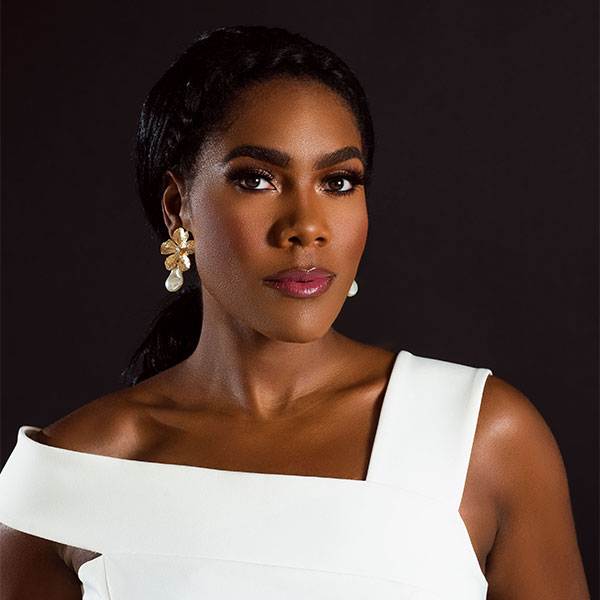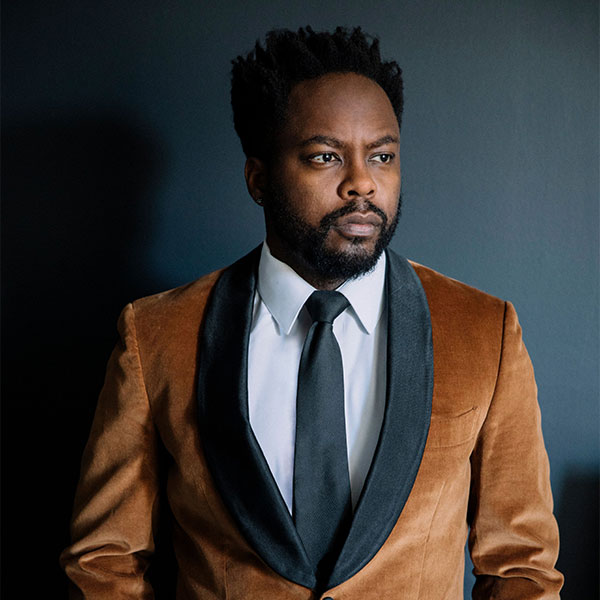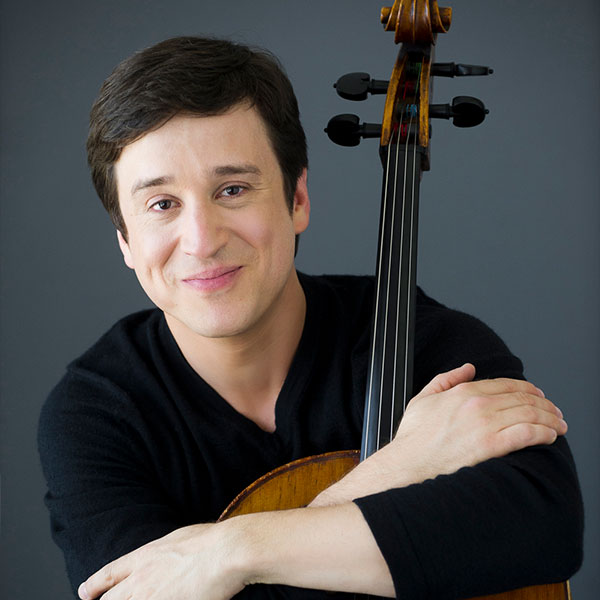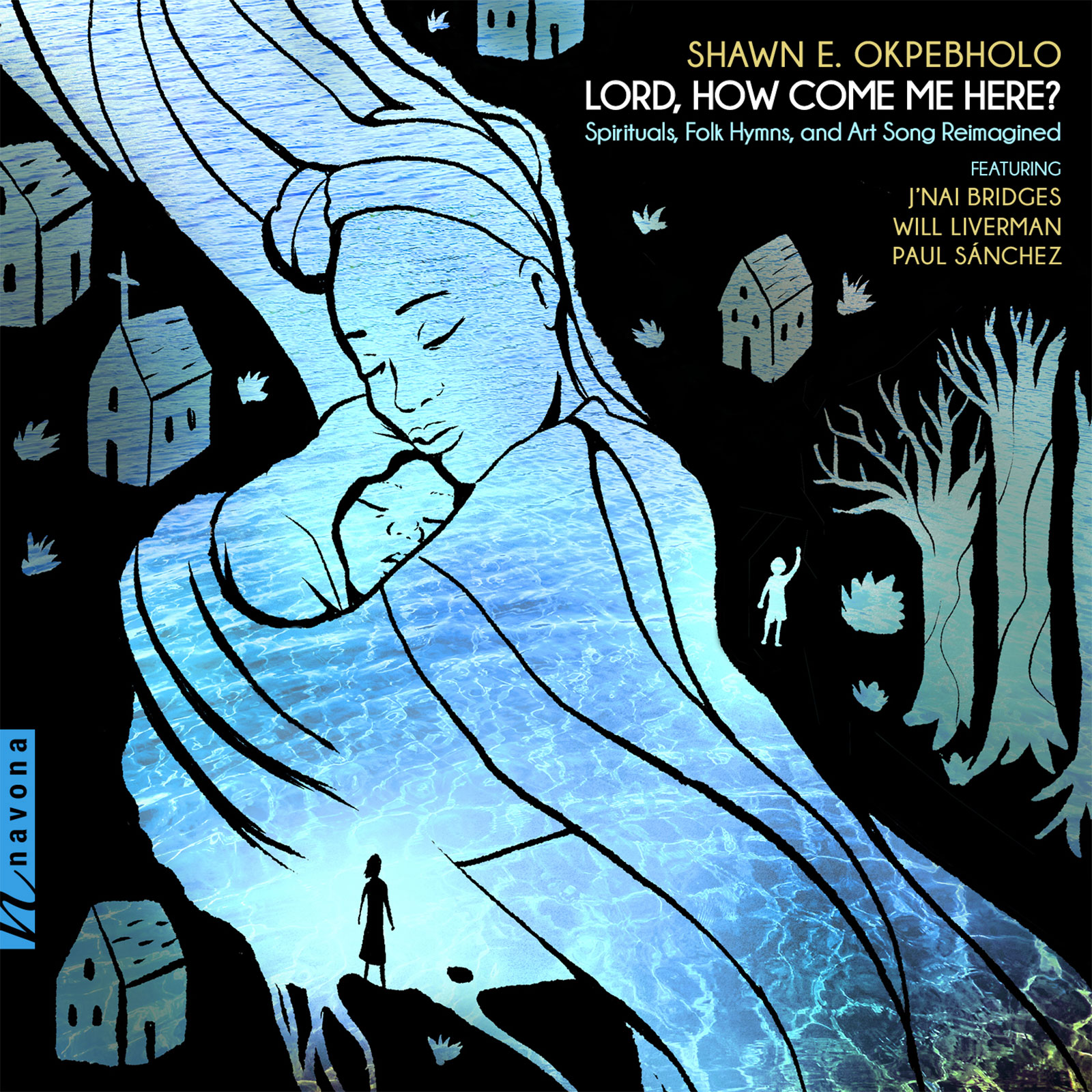Lord, How Come Me Here?
Shawn E. Okpebholo composer
J’Nai Bridges mezzo-soprano
Will Liverman baritone
Paul Sánchez piano
On LORD, HOW COME ME HERE?, composer Shawn Okpebholo turns the mirror of history on today’s society with his own work and a reimagined collection of spirituals by enslaved Africans and American folk hymns that draws upon music from the past to critique contemporary racial injustices in the United States and around the globe. An ensemble of mezzo-soprano (J’Nai Bridges), baritone (Will Liverman), piano (Paul Sánchez), cello, and flute poignantly bring Okpebholo’s music to life, from hopeful anthems celebrating community to laments between a mother and her Creator and hymns celebrating faith and hope over hate and fear.
Listen
Stream/Buy
Choose your platform
Track Listing & Credits
| # | Title | Composer | Performer | |
|---|---|---|---|---|
| 01 | Shall We Gather At The River | Traditional, arr. Shawn E. Okpebholo | Will Liverman, baritone; Paul Sánchez, piano | 6:22 |
| 02 | He’s Got The Whole World In His Hands | Traditional, arr. Shawn E. Okpebholo | J’Nai Bridges, mezzo-soprano; Paul Sánchez, piano | 5:25 |
| 03 | Lord, How Come Me Here? | Traditional, arr. Shawn E. Okpebholo | J’Nai Bridges, mezzo-soprano; Leonardo Altino, cello | 6:32 |
| 04 | I’ve Never Felt Such Love / What Wondrous Love Is This | Traditional, arr. Shawn E. Okpebholo | Will Liverman, baritone; Paul Sánchez, piano | 6:09 |
| 05 | Ride On, King Jesus | Traditional, arr. Shawn E. Okpebholo | J’Nai Bridges, mezzo-soprano; Paul Sánchez, piano | 4:01 |
| 06 | Oh, Glory | Traditional, arr. Shawn E. Okpebholo | J’Nai Bridges, mezzo-soprano; Paul Sánchez, piano | 5:28 |
| 07 | Swing Low, Sweet Chariot | Traditional, arr. Shawn E. Okpebholo | Will Liverman, baritone; Caen Thomason-Redus, flute; Paul Sánchez, piano | 3:15 |
| 08 | Two Black Churches: Ballad Of Birmingham | Shawn E. Okpebholo | Dudley Randall, Marcus Amaker - text; Will Liverman, baritone; Paul Sánchez, piano | 9:23 |
| 09 | Two Black Churches: The Rain | Shawn E. Okpebholo | Dudley Randall, Marcus Amaker - text; Will Liverman, baritone; Paul Sánchez, piano | 6:06 |
| 10 | God Is A God | Traditional, arr. Shawn E. Okpebholo | Shawn E. Okpebholo, text adaption; Will Liverman, baritone; Paul Sánchez, piano | 4:00 |
Tracks 1-7, 10
Recorded April 9, August 11-13, 2018, August 14, 2019 at Armerding Center for Music and the Arts Recital Hall, Wheaton College – Conservatory of Music, Wheaton, IL
Recording Session Producer Shawn E. Okpebholo
Recording Session Engineer Brian Porick
Tracks 8-9
Recorded July 22–24, 2020 at Sauder Concert Hall Goshen College, Goshen, Indiana
Recording Session Producer James Ginsburg
Recording Session Engineer Bill Maylone
Album was supported, in part, by The Senior Scholarship Achievement Award, Wheaton College John Stott Faculty Grant, Wheaton College Faculty Global Research Grant, Wheaton College
Executive Producer Shawn E. Okpebholo
Special Thanks
Caleb Ballard, Xavier Beteta, Brooke Clark Gibson, Keith Johnson, Timothy Larsen, Laurie Loftin, Nathan Miller, Robert Sims, Abigail Stone
Album is dedicated to
Dorthy, Eva, and Corinne Okpebholo
Label Executive Producer Bob Lord
Management Jeff LeRoy, Janet Giovanniello, Tim Finley
Executive A&R Sam Renshaw
A&R Director Brandon MacNeil
VP of Production Jan Košulič
Audio Director Lucas Paquette
VP, Design & Marketing Brett Picknell
Art Director Ryan Harrison
Design Edward A. Fleming
Publicity Patrick Niland, Aidan Curran
Content Manager Sara Warner
Artist Information

Shawn Okpebholo
Shawn E. Okpebholo is a critically-acclaimed and award-winning composer whose music has been described as “devastatingly beautiful” and “fresh and new and fearless” (The Washington Post), “affecting” (The New York Times), “searing” (The Chicago Tribune), “staggering” (The New Yorker), “lyrical, complex, singular” (The Guardian), and “powerful” (BBC Music Magazine).

J’Nai Bridges
American mezzo-soprano J’Nai Bridges, known for her “plush-voiced mezzo-soprano” (The New York Times) and “calmly commanding stage presence” (The New Yorker), has been heralded as “a rising star” (Los Angeles Times), gracing the world’s top opera and concert stages. Recent career highlights include her highly-acclaimed debut at The Metropolitan Opera as Nefertiti in Philip Glass’s opera Akhnaten, and house and role debut with Washington National Opera as Dalila in Samson et Dalila.

Will Liverman
Called “a voice for this historic moment” (The Washington Post), baritone Will Liverman starred in the Met Opera’s reopening production of Fire Shut Up In My Bones in fall 2021. Liverman is the recipient of the 2020 Marian Anderson Vocal Award, 2019 Richard Tucker Career Grant, and Sphinx Medal of Excellence.

Paul Sánchez
Praised as a “great artist” (José Feghali, 2013; Cecilia Rodrigo 2019) and for his “clarity, sensitivity” (The New Yorker), and “prodigious technical capacities” (The Rehearsal Studio), Paul Sánchez is a composer and pianist. Sánchez is a recording artist with ten album releases as of 2022, whose compositions have been recorded to critical acclaim:

Leonardo Altino
Born to musician parents in Pernambuco, Brazilian cellist Leonardo Altino began playing the cello at the age of 6 and gave his first performance at the age of 8. Altino’s national breakthrough came at 14 when he was the youngest winner at the Jovens Concertistas Brasileiros, a prestigious competition in Rio de Janeiro. By 15, he had performed as a soloist with every major orchestra in Brazil and worked with renowned conductors such as Eleazar de Carvalho and Isaac Karabitchevsky.

Caen Thomason-Redus
Caen Thomason-Redus is an accomplished performer, teacher, recording artist, and arts leader who is committed to bringing music to more people. His eclectic musical interests include works by living composers, early music, and improvisation.
Notes
Motivated by the idea of community, our existence and purpose, and the hope of a better place, LORD, HOW COME ME HERE? is an album of Negro spirituals and American folk hymns that I reimagined as contemporary art songs. In a way, this collection of songs began as a continuation of my previous set of reimagined spirituals, Steal Away (2014), though my artistic approach was different this time. During the creative and recording process of this album, humanity experienced profoundly challenging times: in America, our long history of racial injustice was inflamed by vocal politicians and further fueled by public access to videos of police violence against unarmed Black men and women. Around the world, a global pandemic separated families and communities and disproportionately affected the poorest, often people of color. Adapting the music of the enslaved, while also navigating our troubled history, I began to ask, “How much has changed?” On this album, I answer that question by including an original art song that portrays present-day injustices and tragedies not far from the atrocities the enslaved Africans had experienced. As a composer, I long to see my music come to life in meaningful, masterful, and moving ways, especially when my art deals with Black pain, as in this collection. The matchless artistry of mezzo-soprano J’Nai Bridges, baritone Will Liverman, pianist Paul Sánchez, cellist Leonardo Altino, and flutist Caen Thomason-Redus — internationally-acclaimed artists and my dear friends — pushed my artistic vision to new heights on this album, musically, conceptually, and spiritually.
The theme of mother and child is present throughout this album: a lullaby (He’s Got the Whole World in His Hands), a lament (Lord, How Come Me Here?), a song of hope (Oh, Glory), and an art song (“Ballad of Birmingham” from Two Black Churches). At the same time, the image of water is also important in this collection: “The Rain” from Two Black Churches and Shall We Gather At The River, which opens the album. A serene and dynamic setting, Shall We Gather At The River, performed by Will Liverman and Paul Sánchez, serves two purposes: a hopeful anthem celebrating community, and a foreshadowing of the hope of heaven, expressed later in this collection of songs.
When working with words, before composing a single note, I spend a significant amount of time with the text. In the case of the spiritual, I attempt the impossible task of imagining myself in the context of when the songs were first introduced. This part of the creative process was even more necessary for the second work, He’s Got the Whole World in His Hands, because its popularity has caused it to be distanced from its original context as a work that was birthed from oppressed people. Considering how an enslaved mother might sing this spiritual to her child led me to treat this setting as a lullaby. J’Nai Bridges — over three octaves, with delicacy, and at times, conviction — expresses the message of security, longing, and care — the life-giving and sustaining dreams of the enslaved.
Following this lullaby, the album shifts to the most heartbreaking work of the set, Lord, How Come Me Here? I composed this lament as a duo for mezzo-soprano and cello. It is an emotional dialogue between an enslaved mother and her Creator in which she questions her existence and confesses her desire never to have been born. Part of the cello’s response is my reimagining of J.S. Bach’s Cello Suite No.2 in D minor, BWV 1008, a work that I have always associated with deep despair. Bridges and Altino musically execute this struggle in four emotional stages: questioning, lamenting, wrestling, and surrendering.
Love has to be the answer to hopelessness. This compelled me to follow the lament with a composition where I combined a lesser-known spiritual (I’ve Never Felt Such Love) and a southern folk hymn (What Wondrous Love Is This) to remind the listener of a divine love that surpasses all understanding. This work rests in church modes that are not typically associated with love: aeolian and dorian. Nonetheless, Liverman and Sánchez display the complexity, fullness, and consistency of a supernatural love supported through rich harmony and affecting melody.
The subsequent three works are spirituals that tell of a better place. This section begins with a fiery setting of Ride On, King Jesus, where Bridges and Sánchez radiate confidence, excitement, and faith. It is followed by a reflective adaptation of Oh, Glory, in which they portray the anticipation and the hope of heaven, reinforced by the quotation of another spiritual about the hereafter, Bright Mansions. The second verse returns to the maternal theme, which begins calmly and builds in anticipation of a mother reuniting in “paradise” with her child, who was taken and sold away. The final work in this section is the well-known spiritual, Swing Low, Sweet Chariot. It is a trio for baritone, flute, and piano, returning to the lively character of Ride On, King Jesus. The dynamic interplay in this work between Liverman, Thomason-Redus, and Sánchez represents the enthusiasm of the oppressed for a freedom to come when carried home to heaven.
The next work is an original art song. Two Black Churches is a musical reflection of two significant and tragic events perpetrated by white supremacists in two black churches, decades apart: the 1963 16th Street Baptist Church bombing in Birmingham AL, which took the lives of four girls, and the 2015 shooting in Charleston SC, at Mother Emanuel AME Church, which resulted in the deaths of nine parishioners.
The text of the first movement is a poem by Dudley Randall, “Ballad of Birmingham,” a narrative account of the 16th Street Baptist Church bombing from the perspectives of the mother of one victim and her child. Stylistically, this movement includes 1960s black gospel juxtaposed with contemporary art song, with subtle references to the civil rights anthem, We Shall Overcome, and the hymn, Amazing Grace.
The text of the second movement is a poem called “The Rain” by Marcus Amaker, poet laureate of Charleston SC, written specifically for this composition. This poem poignantly reflects on the shooting at Mother Emanuel AME Church. Set in the coastal city of Charleston, which often floods, “The Rain” is a beautifully haunting metaphor on racism and the inability of Blacks in America to stay above water, a consequence of the flood of injustice and the weight of oppression. In this composition, the number nine is significant, symbolizing the nine people who perished that day. Musically, this is most evident through the meter and a reoccurring nine-chord harmonic progression. At the first service at Mother Emanuel following the shooting, the church congregation sang the hymn, ‘Tis so Sweet to Trust in Jesus, testifying to a community that chose faith and hope over hate and fear. I reference that hymn in this movement.
The album concludes with the spiritual God is a God, simply affirming that the God who freed the oppressed in the past has not changed, offering hope, still to this day.
— Shawn E. Okpebholo

